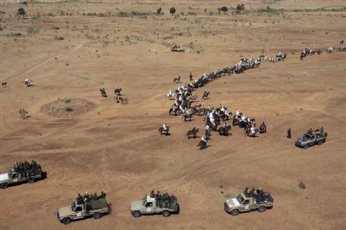Khartoum, Cairo working to deploy joint border force
April 27, 2014 (KHARTOUM) – Sudanese defence ministe Abdel-Rahim Mohamed Hussein has announced that there are ongoing arrangements to deploy a joint Sudanese-Egyptian force on the borders between the two countries to prevent human trafficking and border crimes.

The Egyptian-Sudanese border is known to be a smuggling hotspot, and was also recently highlighted in a report by Human Rights Watch (HRW) as a human trafficking route.
Observers say that the inauguration of border crossings and setting up the joint force is held up by disagreements over the Halayeb region which both countries claim.
Hussein also announced unconditional support to boosting cooperation with Chad in areas of military measures and training besides opening military camps, underscoring that the joint Chadian-Sudanese force contributed to promoting security, political and social ties between the two countries.
The defence minister said that they would transfer the successful experience of the Sudanese-Chadian force to secure borders with Egypt, asserting that success of the force was a result of its contribution to development projects besides efforts it made to resolve tribal problems.
He called for the convening of a forum for border states similar to that which took place in Um Jaras, declaring his government’s readiness to offer the necessary support for military exchange between the two countries given that the two armies complement each other.
The Chadian defence minister, Amir Nadu Takula, said the joint force had managed to secure borders between the two countries, demanding the sharing of the experience to meet security challenges in Africa.
He added that the joint Chadian-Sudanese force had become a model for securing borders and resolving tribal disputes, praising the decision of the Sudanese government to admit 50 Chadian military officers for training in the Sudan Armed Forces (SAF).
The two sides signed a memorandum for transferring the joint forces’ command from Chad to Sudan in its ninth phase.
The commander of the joint force from the Sudanese side, Col. Abdel-Rahman Ahmed Fagiri, announced that the joint force moved from the stage of border control to the stage of development, reconstruction, and peace promotion in order to enhance ties between the two countries.
He disclosed ongoing arrangements to activate the cultural, economic, and social protocols following the success of the security protocol in order to promote all aspects of bilateral relations.
Fagiri pointed that Sudan’s sea port of Port Sudan will begin to receive Chad’s exports in the coming period within the framework of consolidating ties between the two countries, stressing they would move forward to promote development and reconstruction on the border area.
The commander of the joint force from the Chadian side, Gen. Tufa Abdalla Issa, for his part said the force managed to achieve a level of security and stability which the international forces had failed to secure.
He said the strong will of the two presidents contributed to promoting the strong performance of the joint force, adding that the level of crime in border areas has declined and peaceful coexistence and mutual benefits were enhanced.
Issa said the local administrations in Chad and Sudan had also contributed to the success of the joint force mission and participated in resolving several tribal conflicts.
Sudan and Chad deployed Border-Control Force (BCF) along their common borders with the aim of curbing cross-border infiltration.
The deployment followed a normalisation agreement signed between the two sides in January 2010, ending a long history of mutual hostility in which both sides provided support to each other’s insurgents.
The Sudanese-Chadian force is composed of 3,000 troops split evenly between the two sides.
(ST)
